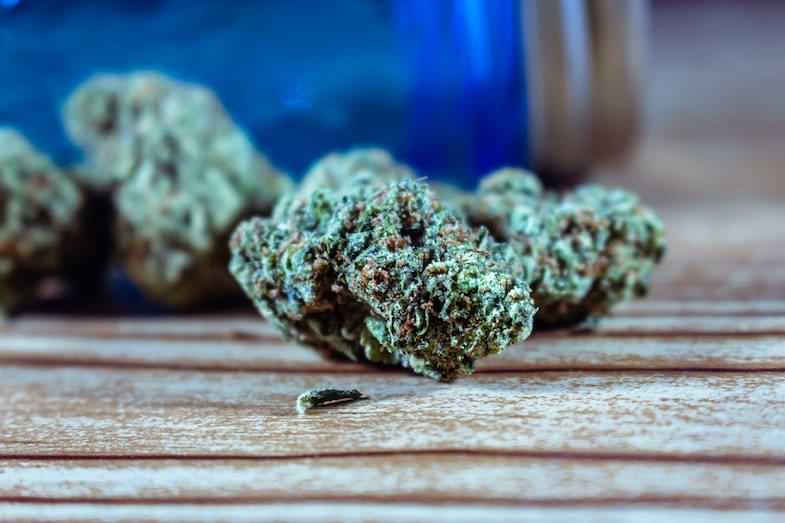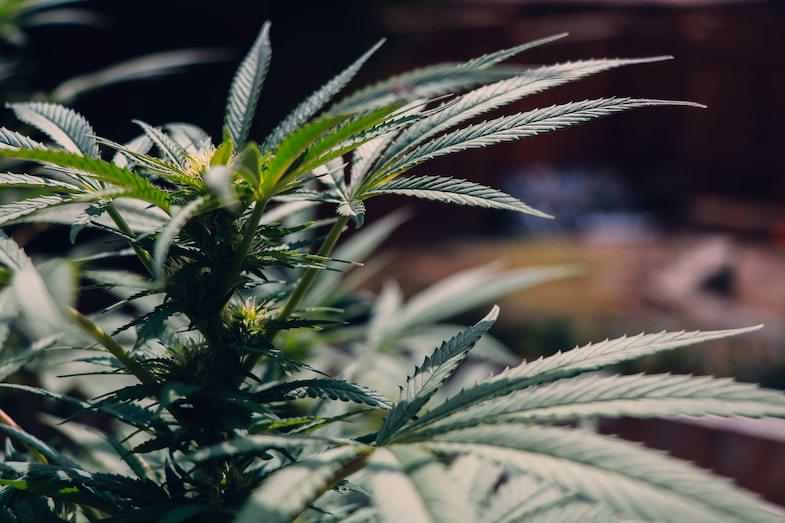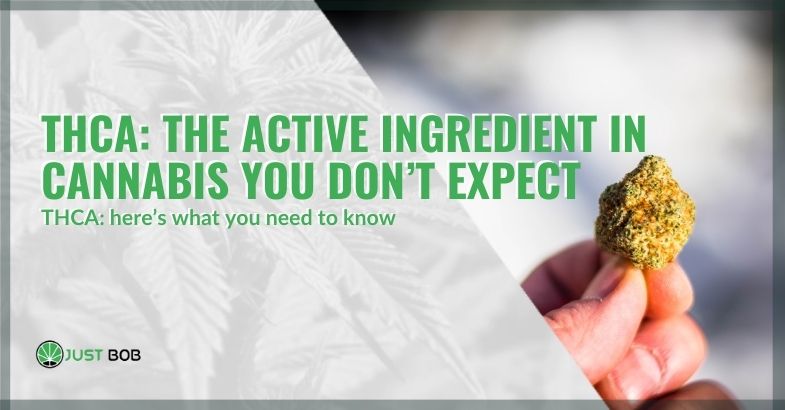Modified on: 01/11/2023
THCA: here’s what you need to know
We know, when it comes to active ingredients or cannabinoids we think exclusively of THC and CBD. You probably know that there are others and that their interaction can give rise to the much discussed entourage effect.
Endocannabinoid system? No problem.
But now we’re about to turn this around with another compound: THCA.
Consider that cannabis and CBD cannabis plants produce over one hundred different cannabinoids, all of which contribute to the effect of a certain smoking, vaping, edible or topical experience. Although many ignore it, THCA is part of the plant and it’s time to learn more.
Continue reading this article and discover the role of this little-known cannabinoid.


What is the THCA?
THCA is the acid form of THC, whose full name is tetrahydrocannabinolic acid.
When a cannabis plant matures and its buds grow, its content of terpenes and cannabinoids begins to develop. The first cannabinoid that the plant develops is CBGA, also called the ‘mother of all cannabinoids’ because it eventually splits and produces primary cannabinoids, such as THCA and CBDA.
THCA is not intoxicating when ingested. Chemically, it has an additional molecular carboxyl ring that prevents it from binding to the brain receptors responsible for the feeling of high.
At this point, then, you may think, “So what is his role?”.
The first thing to keep in mind is that without THCA we would not have the THC nor the many health benefits that are attributed to it which we will discuss later in this article.
Raw cannabis plants naturally produce THCA, but the industry has not always been clear about the distinction from the psychotropic that we all know: in fact, when THCA is exposed to heat, such as smoking, vaping, dabbing or cooking, converts into the intoxicating and beloved cannabinoid THC.
Read also:Treatment of cannabis pests: chemical and natural solutions
THC vs THCA: Are there any differences?
As mentioned, the main difference between THCA and THC is that THCA does not produce the intoxicating effects of THC.
But we also said that THCA must be heated to create THC, through smoking, vaping, dabbing or cooking edibles. This conversion alters the molecular structure of THCA by removing a carboxyl ring and it is exactly this process that helps THC bind to our body’s CB1 receptors.
The effects of THCA and THC overlap in some areas.
Both have the potential to treat nausea, but THCA is much more promising for dealing with inflammation, so is CBD oil. On the other hand, since THCA is not intoxicating, some may find it less effective for sleep than activated THC. Moreover, while THC is not recommended for seizure disorders, THCA can be a valuable ally for dealing with these conditions.
Let’s get into it.


What are the effects and benefits of THCA?
Raw cannabis does not produce the typical ‘high’ feeling when consumed before being decarbonised. However, the consumption of raw cannabis for its THCA content, for example through a juice, or the intake of a tincture or an edible based on THCA, offers some of the same benefits as activated THC without getting intoxicated.
That’s right.
Some anecdotal reports believe that THCA causes some effects, but the molecular structure of THCA prevents it from binding to CB receptors in the endocannabinoid system of our body.
However, at the moment there is not enough data to indicate that THCA does not provide users with pain relief such as THC, although it still interacts with our receptors in a more peripheral way.
However, some studies have shown that it may also have potential neuroprotective qualities that can help slow down and prevent neurodegenerative diseases such as Huntington’s disease. In addition, it seems that it could also help in the treatment of conditions such as colitis and IBS, or Irritable Bowel Syndrome.
Finally, preliminary results suggest that THCA may help with seizure disorders.
Conclusion
In this article we tried to provide a brief insight into one of the less well-known cannabinoids, namely THCA. As we have seen, it is a non-psychoactive compound, unlike its ‘cousin’ THC.
In addition, some preliminary studies have shown that this cannabinoid may prove to be a potential ally in the medical field and for recreational purposes, provided that the research is still ongoing and the studies in the embryonic phase.
Visit Justbob to not miss all the updates and discover the full range of legal cannabis and legal hash varieties.
See you soon on Just bob!









